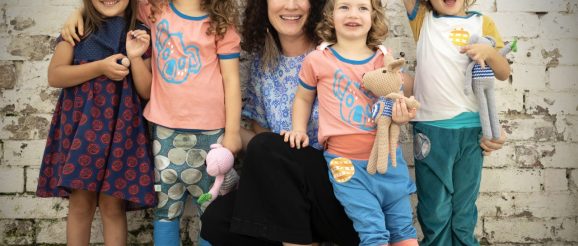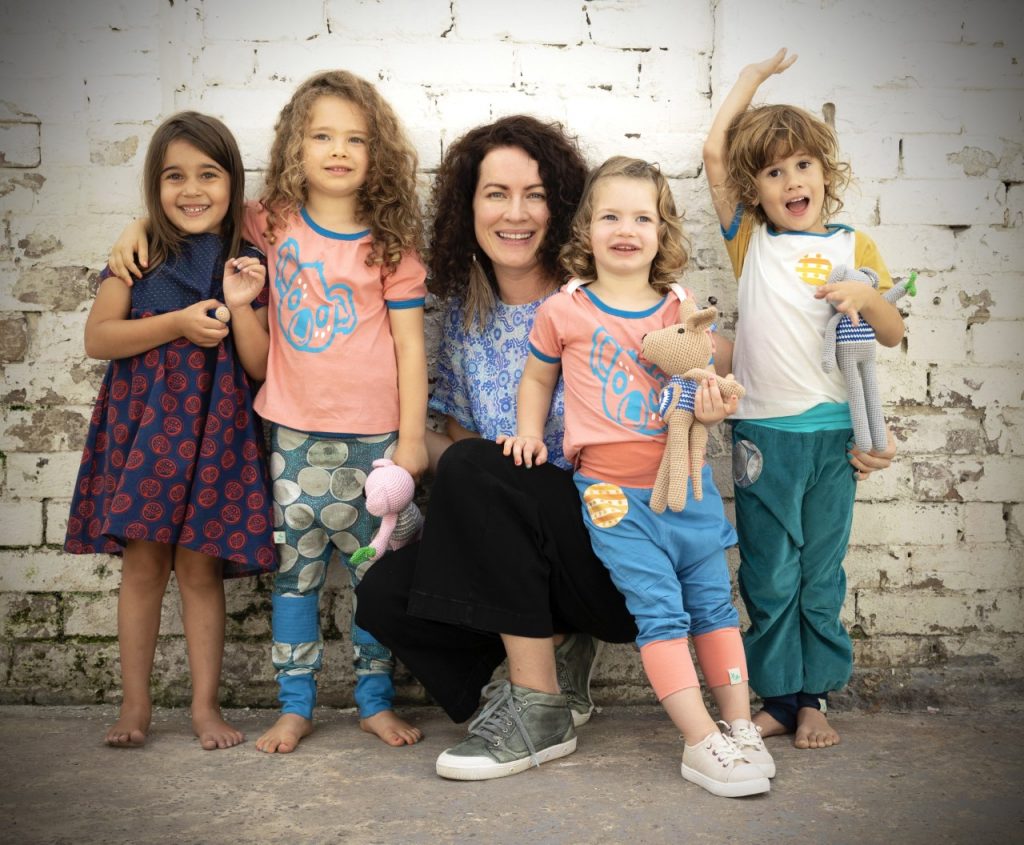5 Minutes with Difference Maker Tammy: Ethical Innovation in First Nations Fashion

Meet Difference Maker Tammy, IBA Accelerator Participant:
Sharing First Nations Story and Culture through Ethical Wearable Art

Tammy Saville, Accelerate with IBA Participant and Founder of DulcieDot
The challenges of ethical production in the fashion industry have led to innovation and creative problem solving.
We sat down with Difference Maker Tammy Saville and discussed the joys and challenges of starting her own children’s label, DulcieDot, and how the IBA Accelerator is providing practical assistance in helping her meet her social impact goals.
TDi: Tammy, tell us the origin story of DulcieDot?
Tammy: DulcieDot was originally established from a place of yearning, a deep desire to teach my children about who we are, about our culture and our connection to Country, and about the incredible women in our family.
Dulcie and Dot were my grandmothers and they were Bundjalung women. They grew up on Country until they were ten, when they were stolen from their mother. They were torn apart from siblings and community to live and ‘work’ 700km away on Gadigal land. As for many First Nations descendants, and for our family, our culture and our stories were lost with that disconnection.
Their resilience and positivity after all they endured has been a huge source of strength for our family. Which has led to a healing journey for us all: Aunts, Uncles, cousins and siblings alike – connecting back together to stand strong in who we are to then be able to teach our children the ways, making sure that our story and culture isn’t lost from generation to generation.
How did you make the leap from this desire to preserve your family story, to starting a childrenswear brand?
Firstly, teaching our story to my children led to a desire to collaborate with Aboriginal artists to both learn and assist in telling their untold stories, and to share these stories with the next generation of little world-shapers.
DulcieDot is about extending that storytelling to both First Nations and non-First Nations children in the form of wearable art – on clothing. The more awareness and education surrounding Aboriginal culture and all First Nations culture, the better.
Another element behind the brand came from the frustration of how quickly kids grow out of clothes and the devastation created with mass-produced, poorly-made textiles. I wanted to create ethically-made clothes that grow with the child a little, so that they get more wear out of the garment.
Tell us more about this sustainability angle, this idea of clothes that grow with the child, I love that!
The idea is to make the item as sustainable and long-lasting as possible. Up to 90% of the clothes that my children have are within a circular economy with friends and family. I’m one of six siblings and between us we have 12 kids (not to mention extended family) so we’ve got lots of clothes that we pass between us.
The good quality garments have lasted for many kids through quite a bit of growth, whereas a lot of the cheaper stuff has not lasted even the wear of one child. I wanted to design clothes that are made as ethically as possible, with features to make them last longer. So you can buy less, choose well and make it last.
For example, the DulcieDot range has pants with expandable waists, and with cuffs that roll down for extra length. I have two daughters and every few weeks there will be a massive hole in the knees of their leggings, so our leggings range have knee patches that provide a little bit of extra padding. And I’ve got little tunics that fit at a longer length when the kids are little, and can be kept for 2-3 years to fit as a top as the child grows.
You’ve collaborated with three different artists for your first collection, could you share a bit about these relationships?
Agnes Kohler (nee Goongarra) is a Kaidildt woman born on Gununa, Mornington Island, her people are from Bentinck Island which was the last colonised community off Australia. Her artwork, Mudshells, in our collection depicts stories of her homeland.
Noelene Hills is a Lardil woman born at Baralkia and living at Gununa, Mornington Island. Noelene’s artwork featured in our first collection is called Bunbudgee, and is about the white bush dove. Bunbudgee means white bush dove in Lardil. This is my totem from my Mother’s Father.
Both of these Mornington Island Artists I found via their Instagram page and website and connected from there.
The third artist we partnered with is Daphne de Jersey, her artwork and story spoke to me as we both share the story of having grandmothers of the stolen generation. I originally found her through Wei’num Arts, and have since connected from there.
Daphne is from Mapoon in far north QLD, her inspiration comes from her own life experiences and events, coupled with her knowledge of bush food which was passed down from her mother and is a signature representation in her works. Her piece, Gweeni, features in our collection and depicts the edible seed bud of the fresh water lily found in Northern swampland.
We’ve been really honoured to work with all three women. They are just itching to see the final garments now! It’s been quite a process.

DulcieDot Tunic and Leggings featuring Daphne de Jersey’s artwork, ‘Gweeni’
Is there anything that has been unexpected or surprising to you about this collaboration?
I’ve realised there’s so much more that needs to be done in that sector – with artists’ representation and making sure that they’re paid directly and correctly for their work! The economic impact of this work is so important.
And clearly, you’re wanting to address that with DulcieDot…
Absolutely, that’s a whole other element that I’m building into the business as well. That’s part of what the IBA Accelerator and TDi have really helped me to do – to break down where I want to go with the social impact side of the business.
I’m working doing this in partnership with the artists but I’ve realised that’s a whole other arm of the business. I’ve come in with these big ideas to build the business and artist programs all at once and my coaches [through the IBA Accelerator program] have gone “Hang on a minute, let’s break this down into steps.”
So, I really had to strip back what I’m doing and figure out what I’m capable of right now. The whole process has been really helpful with making a strong foundation for the stepping-stones that follow, instead of getting burnt out and overwhelmed, and not reaching where I want to be in the far distance.
So, the coaching side of things – the IBA Accelerator, and working with the coaches – what have you found valuable about that relationship?
I came into the IBA program after ending a year of absolute burnout after an intense few years: Running another business full time, and building this new one, with a young family, in a pandemic! I’ve been wanting to have a business with its core purpose being driven by positive social impact for First Nations people for many years – and the tipping point to doing this was having my children, and starting to live my truth and take action.
Then covid hit and I finally had the time to put it into action, or so I thought! I ended up slumping into the end of 2021 with my first week off in two years, and just collapsing.
So, starting this afresh and having Anne [TDi Senior Consultant] and Isaac [IBA Accelerator Lead] just say “Look, let’s break this down into stages” gave me that mental boost and direction. Having that support, and the feedback to remind me, “You don’t have to do this all at once,” has been super helpful.
You mentioned earlier it has been quite a process getting to the end stage of the actual garment production, tell us more about that…
Yes, one of my biggest hurdles has been working with offshore manufacturers. It’s been honestly painstaking. But in the process I’ve found ethical manufacturers in Australia, one that’s just up the road from me in Newtown: The Social Outfit.
I had been looking for someone locally, after all the stress, and I realised I know Joss, the production manager there. She has been so incredibly helpful. I wish I found her a year ago, because within a few conversations with her, I learned so much! I was like, “Oh my goodness, you could have saved me eight months!”
So now I’m getting to work on the next collection, and working out how I can do it all affordably and ethically here. It’s a lot more expensive, and the margins are quite small. Making sure that the artists and makers are paid correctly, and that the fabrics are sourced in an ethical way, are the main priorities right now.
We have worked with GOTS [Global Organic Textile Standard] organic fabrics for the first collection and will continue to use organic and natural fibres ongoing, but we are also looking at working with upcycled fabrics for the next collection. The Social Outfit has really useful and sustainable ways of using fabric, so I’m getting a lot of insight and inspiration from them.
It sounds like finding that balance between ethical manufacturing and affordability is a current challenge you’re working on in the IBA Accelerator program?
Absolutely, it can be challenging manufacturing sustainably in Australia – both environmentally and economically – with ethically-sourced fabrics. I am still trying to work this out in the program. But now I can see how I can actually make the business work, we are getting there!
Before we finish up, you’ve mentioned a few of the challenges you are facing. I’d love to know, what has been your greatest joy throughout all of this, and can you tell us what’s next for you in the DulcieDot journey – what are you looking forward to?
One of my greatest joys on this journey has definitely been working with the artists and learning their stories, that’s been really beautiful.
I’m looking forward to getting started on the next collections! I would really love to work with artists within the Sydney region and the Illawarra region – that’s something I’m working on, moving forward. We are actually about to leave Bidjigal Gadigal Country and move to the Illawarra Dharawal Country to raise our two beautiful jarjums closer to family, the coast, and the bush. I’m really looking forward to meeting and getting involved with a new community there.

The DulcieDot ethical childrenswear range launches next month.
We are so excited to be bringing you an advanced preview of the DulcieDot range! Tammy is due to launch her first collection in early April. Head to the DulcieDot website to register for updates, and stay tuned to our social channels.
The IBA Accelerator Program is a partnership between Indigenous Business Australia and The Difference Incubator. To find out more about the IBA Accelerator program, and how TDi is growing Difference Makers, read our feature article.
